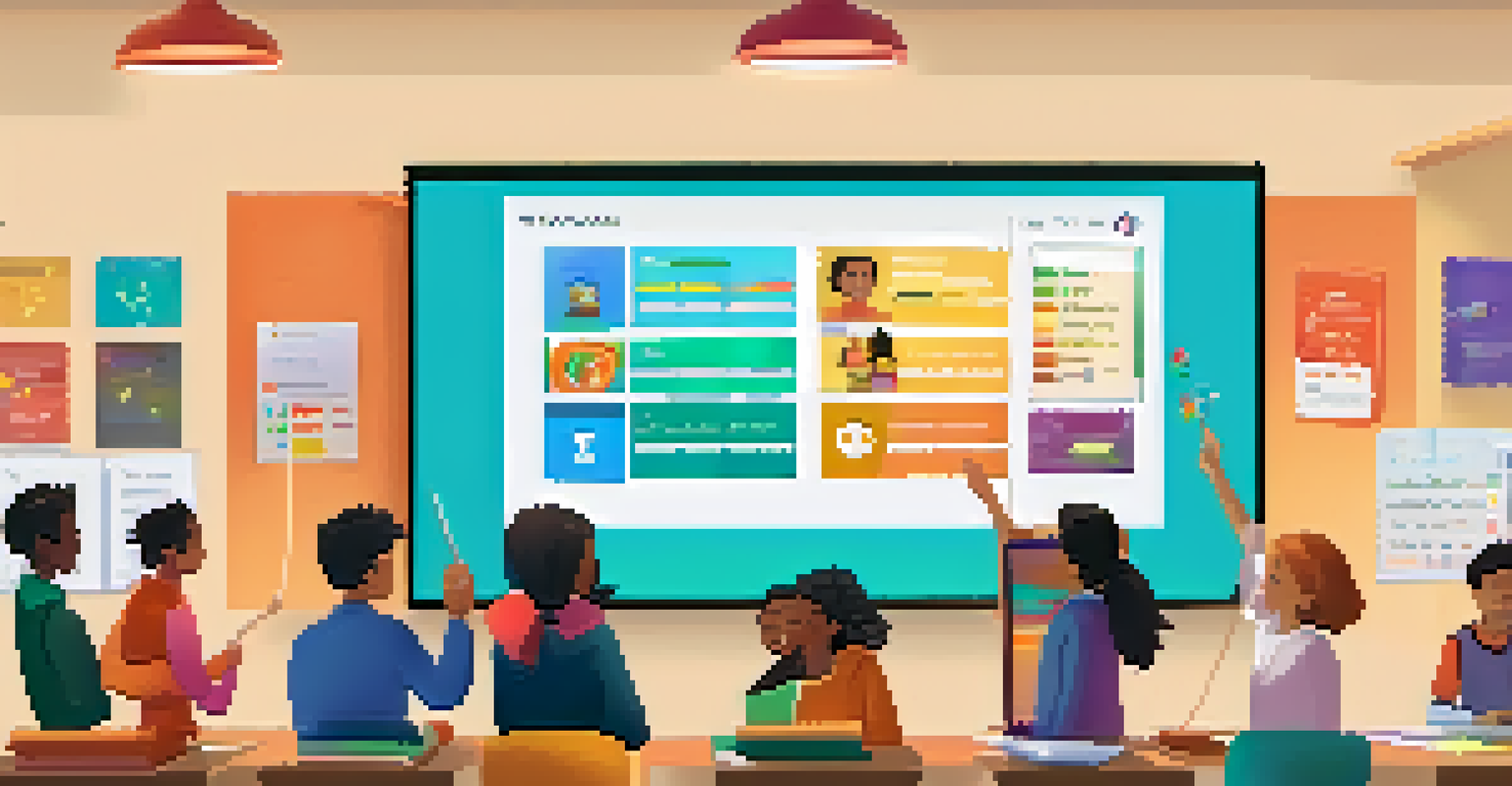Integrating Artificial Intelligence in Online Education

Understanding AI's Role in Online Education
Artificial Intelligence (AI) is revolutionizing online education by providing personalized learning experiences. It analyzes student interactions and adapts content to fit individual needs, making learning more effective. Imagine a tutor who knows you so well that they can predict when you’ll struggle and offer help before you even ask.
Education is not the filling of a pail, but the lighting of a fire.
This technology can assess a student’s strengths and weaknesses, creating customized study plans that cater specifically to their learning pace. For example, if a student excels in math but struggles with writing, AI can adjust the curriculum accordingly. This level of personalization is akin to having a personal coach guiding you through your academic journey.
Moreover, AI-powered platforms can provide instant feedback, allowing students to adjust their study habits in real-time. This immediate response not only keeps learners engaged but also helps them feel more confident in their abilities. The integration of AI into education is not just a trend; it’s becoming a fundamental part of how we learn.
Enhancing Engagement with AI Tools
Engagement is a critical factor in online education, and AI tools are designed to boost it. Interactive elements like chatbots and virtual assistants can answer questions 24/7, ensuring that students never feel stuck or alone. Imagine having a study buddy who’s always available, ready to help you out whenever you need.

Additionally, gamification—using game-like elements in learning—can significantly enhance engagement. AI can analyze student performance and tailor challenges to keep learners motivated. Think of it as leveling up in a game; students are more likely to stay engaged when they see their progress and achievements.
AI Personalizes Learning Experiences
AI tailors educational content to individual student needs, enhancing engagement and effectiveness in online learning.
AI also enables adaptive learning environments, where the content adjusts based on student interactions. This dynamic approach keeps students interested and invested in their education, transforming the online classroom into an interactive learning hub. By incorporating these tools, educators can create a more stimulating and enjoyable educational experience.
Streamlining Administrative Tasks with AI
One of the often-overlooked benefits of AI in online education is its ability to streamline administrative tasks. For educators, grading assignments and managing course materials can be time-consuming. AI can automate these processes, allowing teachers to focus on what they do best—teaching.
The only limit to our realization of tomorrow will be our doubts of today.
For example, AI can grade multiple-choice tests and even provide preliminary assessments on written assignments. This not only saves time but also ensures consistency in grading. Imagine being able to dedicate more time to engaging with students rather than getting bogged down by paperwork.
Furthermore, AI systems can help institutions manage enrollment processes and track student progress efficiently. This data-driven approach allows for better decision-making and resource allocation. In a fast-paced educational environment, these efficiencies are invaluable as they enhance the overall learning experience.
Personalized Learning Paths Through AI
Personalized learning paths are a game-changer in online education, and AI is at the forefront of this evolution. By analyzing a student’s learning habits, AI can recommend specific resources and courses tailored to their unique journey. It’s like having a GPS for education, guiding students through their academic landscape.
These paths can adapt over time, reflecting changes in a student’s interests or performance. For instance, if a student discovers a passion for data science, AI can suggest additional courses that align with that interest. This flexibility ensures that education remains relevant to each learner’s goals.
AI Enhances Student Engagement
Interactive AI tools like chatbots and gamification strategies help keep students motivated and actively involved in their education.
Moreover, personalized learning paths can motivate students by allowing them to take ownership of their education. When learners see a clear route to their objectives, they’re more likely to stay engaged and committed. This self-directed approach fosters a deeper connection to the learning material, ultimately leading to better outcomes.
AI in Assessment and Feedback Mechanisms
Assessment is a vital part of any educational program, and AI enhances this process significantly. Through advanced algorithms, AI can evaluate student performance more effectively, providing insights that traditional methods often miss. For example, AI can identify patterns in student errors, helping educators understand where learners struggle the most.
Additionally, AI can facilitate continuous feedback, offering students real-time assessments on their understanding. This instant feedback loop allows learners to adjust their study strategies promptly, much like an athlete receiving coaching tips during practice. As a result, students can address issues before they become problematic.
Furthermore, AI can create adaptive testing environments that adjust the difficulty of questions based on a student’s responses. This not only provides a more accurate measure of a student’s abilities but also keeps them engaged by presenting challenges that are just right for their skill level. The ability to assess and adapt in real-time is reshaping how we view student evaluation.
Supporting Diverse Learning Styles with AI
Every student learns differently, and AI has the potential to support a variety of learning styles. By offering multiple formats—such as videos, interactive quizzes, and reading materials—AI can cater to visual, auditory, and kinesthetic learners alike. This approach ensures that all students have access to the resources that resonate with them most.
Moreover, AI can track how different students interact with content, allowing educators to refine their teaching methods. For example, if data shows that a visual learner excels with video content, instructors can provide more of that type of material. This targeted approach is like having a personalized study guide that evolves based on your preferences.
AI Streamlines Administrative Tasks
By automating grading and enrollment processes, AI allows educators to focus more on teaching rather than administrative burdens.
Inclusion is a key aspect of modern education, and AI plays a crucial role in making learning accessible for everyone. By supporting various learning styles, AI helps create an inclusive environment where all students can thrive. This commitment to diversity enhances the overall educational experience and fosters a sense of belonging.
Future Trends: AI's Evolving Role in Education
As technology continues to advance, the role of AI in education is expected to evolve further. Future trends indicate that AI will become even more integrated into learning environments, providing tools that enhance not only teaching but also student well-being. For instance, AI could monitor student engagement and mental health, offering support when needed.
Moreover, the potential for virtual reality (VR) and augmented reality (AR) combined with AI is immense. Imagine students participating in immersive learning experiences, like exploring ancient civilizations or conducting virtual science experiments. These innovative methods can make education more engaging and impactful.

Ultimately, the future of AI in education looks promising, with the potential to create even more personalized, inclusive, and effective learning experiences. As we embrace these advancements, we can look forward to a new era of education that is responsive to the needs of every learner. The possibilities are exciting, and the journey has just begun.